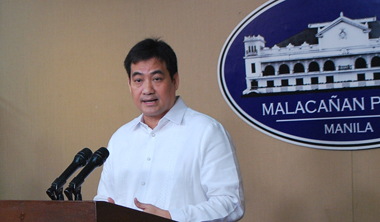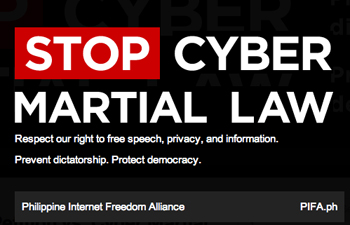BANGKOK — Less than a week after a new cybercrime law came into force in the Philippines, the country’s Supreme Court today ruled to suspend implementation, pending review to decide if the law undermines civil liberties.
The suspension comes after a public outcry mounted against some of the provisions of the law, which aims to curb cybersex, online child pornography, identity theft and spamming.
Sounds fair enough, but opponents say it’s also full of overreaches. For instance, the law makes libel — already a criminal rather than tort or civil offense in the Philippines — punishable by up to 12 years in jail if committed online.
Protests against the law look set to continue pending its revision. If you open the Philippines Internet Freedom Alliance website, you are greeted by a black page calling on the country’s government to “Stop Cyber Martial Law.”
The “martial law” the alliance is referring to is the Cybercrime Prevention Act, which came into force on October 3. A banner on PIFA’s homepage with a call to action to protest the law reads, “Prevent dictatorship, protect democracy.”
Martial law and dictatorship are loaded terms, at least for Filipinos above a certain age. The Philippines ditched dictatorship as far back as 1986, when infamous tyrant Ferdinand Marcos stepped down after mass street protests in Manila.
For some, the new law evokes an old, oppressive past.
The Backlash
Discussing the new Internet law with PBS MediaShift, Melinda Quintos de Jesus, head of the Manila-based Center for Media Freedom and Responsibility, said that “effective enforcement of this law will definitely curtail Internet freedom, which is the free-est platform for free speech and free expression and even press freedom, given its speed and ease to disseminate news.”
Prior to today’s Supreme Court suspension, the CMFR tabled a joint submission to the country’s Supreme Court along with National Union of Journalists and the Philippine Press Institute, linking the new law with the Philippines’ authoritarian past, saying that it “undermines all the fundamental guarantees of freedoms and liberties that many have given their lives and many still give their lives work to vindicate, restore and defend.”
More practically, the law will impact adversely “an entire generation’s way of living, studying, understanding and relating,” given the growing importance of the Internet in people’s lives in the Philippines, the petitioners wrote.
Others took more direct action, with hackers taking down several government websites over recent days, prompting an appeal for restraint from the president’s office.
The backlash against the law prompted some backtracking among its proponents, in turn sparking some hope that at least some of the more onerous provisions in the law — particularly the online libel clause — would be revoked.
As things stand, libel in the print media carries a four-year maximum jail sentence in the Philippines. The new tripling of jail time for online offenses is said to be due to the Internet’s global reach, weighed against the local remit of the country’s print media. But to some, even the country’s pre-existing libel punishment is too much.
In an email to MediaShift, a spokesperson for the U.K.-based Media Defence Legal Initiative, which assists journalists facing legal challenges, wrote that “it is our opinion (and that of the UN Human Rights Committee — see, for example, their latest General Comment No. 34) that imprisonment, for whichever duration, is never an appropriate punishment for libel.”
The law also provides for warrant-less monitoring of users’ data and empowers authorities to block or remove websites without court review, matters also put to the Supreme Court in the various submissions put forward in recent days.
Backtracking
By October 4 there were 10 petitions in the high court seeking to repeal or suspend the implementation of the law, a day after it took effect on Wednesday last week. The same day the government was conceding ground on the matter, with Edwin Lacierda, spokesman for President Benigno Aquino III, “acknowledging that” :http://www.gov.ph/2012/10/03/statement-of-the-presidential-spokesperson-on-the-cybercrime-prevention-act-of-2012/ that “questions have been raised about the constitutionality of certain provisions of the act. We recognize and respect efforts not only to raise these issues in court, but to propose amendments to the law in accordance with constitutional processes.”

Also backtracking somewhat is one of the law’s main authors, Senator Edgardo Angara, who said he would file a bill removing the provision of the law imposing higher penalties for libel. “There is no reason to be apprehensive and anxious because many of my colleagues have expressed enthusiasm in amending it,” he said on TV on Friday night.
Fears that liking or sharing an article, post or comment could be a breach of the new law are unfounded, said Angara, who believes that there needs to be proof of a conspiracy to libel the target of the article or post between the original author and those who share.
However, it seems that the senators who pushed for the bill are now distancing themselves from it, according to Sen. Angara. With his colleagues pulling a collective “wasn’t me” as the predictable backlash grows ahead of senate elections scheduled for 2013, Angara appears to have been left alone to defend the law – though only one senator – Teofisto Guingona – voted against the bill.
“I would wish that my fellow senators who supported this enthusiastically should also stand up and explain. This is a common effort; this is not just me,” Sen. Angara told Prime Time, a popular night-time news review show on ABS–CBN news channel.
Empowering the litigious
The Philippines is a notoriously litigious country, according to the Committee to Protect Journalists. So the new law sounds like it could mean a field day for rent-seeking lawyers, as arguing such cases could take years, and in turn will give politicians with money leverage against critics.
Litigation is another implicit prohibition for media in a country that has one of the world’s highest kill-rates for journalists and more often than not, impunity for those who murder reporters.
The new cyber-law could, if not revised, lead to increased self-censorship among the country’s media.
The Philippines has long been known for having its share of politicians on the make — with former President Gloria Macapagal Arroyo charged with “plunder” on October 3 — and graft is often cited as one of the reasons why the country’s economy has not made the same progress as neighbors such as Malaysia or Thailand.
Lamenting what she described as “the prevailing culture of corruption” in the Philippines, de Jesus told Mediashift that the proposed internet law stems from “politicians who feel that too much freedom in communication and news sharing, such as the Internet makes possible, will make it more difficult to hide corruption and wrongdoing.”
Simon Roughneen is a southeast Asia-based journalist who has reported from the Philippines several times. He writes for the Christian Science Monitor, The Irrawaddy and others. He is on twitter @simonroughneen and you can Circle him on Google+.

